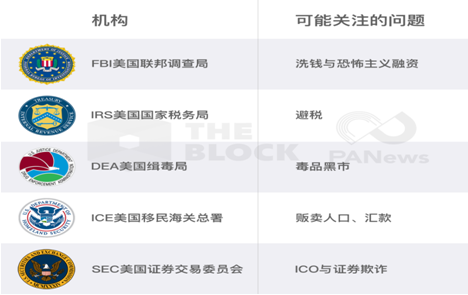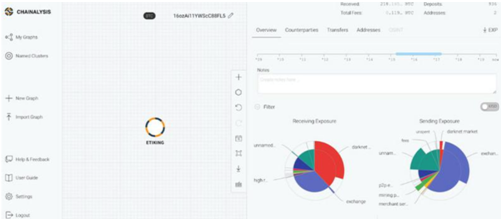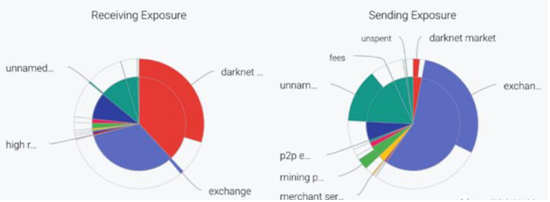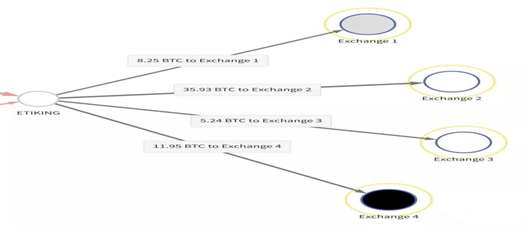Overview of Cryptocurrency Market Regulation: Status, Demands, and Challenges
This article is the result of the phased work of the "key steward" research group.
I. Challenges Facing Cryptocurrency Market Regulation
With the development and popularity of blockchain technology, a large number of cryptocurrencies based on blockchain technology have emerged from 2017, and a cryptocurrency market of considerable scale has formed. However, the cryptocurrencies represented by Bitcoin are anonymous and may be used by criminal organizations as illegal trading tools. Therefore, although cryptocurrencies are widely held by the public and have been increasingly used, most countries have not identified cryptocurrencies as currencies and have implemented strong regulatory policies for cryptocurrency transactions.
When global financial regulators supervise cryptocurrencies such as bitcoin, they basically gather the supervision objects into cryptocurrency exchanges where cryptocurrencies are exchanged with fiat currencies. If cryptocurrencies are only exchanged two-way with fiat currencies and the exchange strictly enforces the KYC (Know Your Customer) policy, then regulators can track most transactions. China Yinfa [2013] Document No. 289 "Notice on Preventing Bitcoin Risks" clearly requires "effectively fulfilling statutory anti-money laundering obligations such as customer identification, suspicious transaction reports, and effectively preventing the risk of money laundering related to Bitcoin." However, if Cryptocurrencies are not associated with fiat currencies, and transactions occur only between cryptocurrencies, so it is difficult for regulators to effectively track transactions. In fact, this is one of the reasons many traditional financial institutions stay away from cryptocurrencies.
With the emergence of more and more cryptocurrency OTC exchanges, the implementation of KYC policies has encountered great challenges. If the regulators cannot effectively supervise cryptocurrency transactions, including their inclusion in the anti-money laundering system, then once the cryptocurrency departs from the existing regulatory system and has a large-scale connection with the existing financial system, this will bring huge benefits to the current financial system. risk. At present, the only way is to urge cryptocurrency exchanges to formulate a sufficiently strict KYC policy to force cryptocurrency transactions into the anti-money laundering system.
- Chief Economist of CBEX: Bitcoin lacks correlation with mainstream assets and can be included in investment portfolios
- If you halve, you will appreciate. Half a bitcoin is more valuable?
- Founder of Wikipedia who was forced into a hot spot: BSV is impossible in this life
On the other hand, as the price of Bitcoin has become more and more stable, many individuals and institutions have begun to accept and hold Bitcoin, and the entire transaction process no longer requires the involvement of fiat currencies. This poses greater challenges to financial regulation.
Cryptocurrencies are used as illegal trading tools
As mentioned above, cryptocurrencies are anonymous and may be used by criminal organizations as illegal trading tools. Take the following examples.
1.Dark web "Silk Road" uses cryptocurrency for illegal transactions
"Silk Road" is a world-renowned dark web site that can anonymously and illegally use cryptocurrency as a trading tool to buy and sell drugs and other illegal goods and services. In 2014, the New York Police announced the ban on the Silk Road website and confiscated approximately 29,655 bitcoins (approximately $ 28 million at the time of the bitcoin price). These bitcoins were subsequently auctioned by the US Department of Justice.
2.Bitcoin ransomware as ransom to recover documents
In May 2017, the global Internet broke out with the WannaCry ransomware virus. In just a few days, the networks of more than 150 countries have fallen. In China, many universities, gas stations, train stations, self-service terminals, hospitals and government office terminals have been attacked. infection. The files of the computer terminal infected by the virus are encrypted, which prevents the work from being performed normally. The victim was asked to pay $ 300 worth of Bitcoin ransom to 13AM4VW2dhxYgXeQepoHkHSQuy6NgaEb94 account address in exchange for document decryption. The global direct damage caused by the cyber attack totaled approximately $ 8 billion (about 55 billion yuan).
3. PlusToken allegedly uses cryptocurrency to organize MLM activities
PlusToken was originally a decentralized cryptocurrency wallet that supports a variety of cryptocurrencies such as Bitcoin, Ethereum, Litecoin, Dogecoin, Bitcoin Cash, Ripple. In order to obtain more illegal profits, PlusToken is suspected of adopting a pyramid scheme to attract members. As of March 15, 2019, the platform has more than 1 million members and has collected membership fees of more than 10 billion yuan. On June 27, 2019, a run on the PlusToken wallet made it impossible to withdraw coins. On the same day, law enforcement agencies of the Republic of Vanuatu arrested a number of Chinese suspected of using the PlusToken network platform to engage in pyramid schemes. On July 6, 2019, Vanuatu police handed over the suspects to the Yancheng Police in China. According to investigations, the ETH wallet address in the PlusToken wallet is 0xf4a2eff88a408ff4c4550148151c33c93442619e, and the remaining balance nearly 2 months ago was 789,511.45 Ethers, worth about $ 233.9 million.
4.The U.S. Department of Justice has cracked down on several illegal and criminal activities using Bitcoin as a trading tool
The U.S. Department of Justice auctioned 4,040.54069820 Bitcoins (approximately $ 40 million at the time of the Bitcoin price) on February 3, 2020. The bitcoins were confiscated by the US Department of Justice in dozens of federal criminal, civil and administrative cases.
Cryptocurrency-related regulatory policies in various countries
The cryptocurrency industry chain is mainly composed of exchanges, mining pools, wallets, project parties, custodian institutions, over-the-counter transactions, media, and communities. These departments are also the key regulatory objects in the cryptocurrency field. However, after all, cryptocurrencies are a new thing. The degree of market openness, financial supervision capabilities, and regulatory priorities in different countries are also different. Therefore, each country's understanding of cryptocurrencies, regulatory priorities, regulatory content, and regulatory intensity are different. However, all major countries in the world have made the regulation of cryptocurrency a priority in their current work.
China
In December 2013, in order to protect the rights and interests of social public property, protect the legal currency status of the RMB, prevent money laundering risks, and maintain financial stability, the People's Bank of China, the Ministry of Industry and Information Technology, the China Banking Regulatory Commission, the China Securities Regulatory Commission, China The Insurance Regulatory Commission jointly issued the "Notice on Preventing Bitcoin Risk" (Yinfa [2013] No. 289). The notice clarified the nature of Bitcoin and believed that Bitcoin is not issued by the monetary authority, does not have monetary properties such as legal compensation and compulsory, and is not a real currency; Bitcoin is by nature a specific virtual currency. Commodities do not have the same legal status as currency and cannot and should not be used as currency in the market. However, as a kind of commodity buying and selling behavior on the Internet, ordinary people have the freedom to participate in the premise of bearing their own risks.
Since the beginning of 2017, a large number of financing activities through the ICO for token issuance and speculative speculation have prevailed. These acts have been suspected of illegal financial activities and severely disrupted the economic and financial order. In order to implement the spirit of the National Financial Work Conference, protect the legitimate rights and interests of investors, and prevent and mitigate financial risks, the seven ministries and commissions jointly issued the "Announcement on Preventing the Financing Risk of Tokens" in September of that year. The announcement found that "the financing of token issuance refers to the financing entity's raising of so-called" virtual currencies "such as Bitcoin and Ethereum from investors through the illegal sale and circulation of tokens, which is essentially an illegal public financing without approval. Behavior, suspected of illegally selling token tickets, illegally issuing securities, and illegal fundraising, financial fraud, pyramid schemes and other illegal criminal activities. "
In November 2019, the Shenzhen Local Financial Supervision and Administration Bureau issued a notice on its official website on "Reminders on Preventing Risks of" Virtual Currency "Illegal Activities", stating that "the recent use of blockchain technology to promote the promotion of virtual currency hype has increased. "Some illegal activities show signs of resurgence." The notice also stated that the Shenzhen Mutual Funds Rectification Office will conduct investigations and obtain evidence for illegal activities. Once found, it will be dealt with seriously in accordance with the requirements of the "Announcement on Preventing the Financing Risks of Tokens".
2. United States
According to the latest "Cryptocurrency Act 2020" issued by the United States, its preliminary discussions are as follows.
Assign the definitions of "Federal Digital Assets Supervision Agency" or "Federal Crypto Regulatory Authority" to three agencies, namely the Commodity Futures Trading Commission (CTFC), the Securities and Exchange Commission (SEC), and the Financial Crimes Enforcement Network (FinCEN). Divides digital assets into three categories: cryptocurrencies, crypto commodities, and crypto securities.
Federal password regulators fall into this category and are defined as the only government agencies authorized to regulate the following. These government agencies include: the US Commodity Futures Commission (CFTC), which is responsible for crypto commodities; the Securities and Exchange Commission (SEC), which is responsible for crypto securities business; and the Financial Crimes Enforcement Network (FinCEN), which is part of the US Treasury Department, responsible for cryptocurrency business. Each federal password regulator is required to provide and maintain an up-to-date list of all federal permits, certificates, or registrations that are required to create or trade digital assets. The Finance Minister is required to adopt FinCEN to establish rules similar to the ability of financial institutions to track cryptocurrency trading capabilities.
In 2019, the U.S. SEC issued guidelines to determine the legality of digital currency securities and issued multiple warnings to fraudulent crypto asset trading websites and the crypto industry. Since the end of May, the IRS has begun regulating taxes on cryptocurrency transactions. In June, the IRS identified several specific tax issues for cryptocurrency transactions and began reviewing taxpayer cryptocurrency assets at the end of June. In October, the IRS released its first cryptocurrency tax guide in five years, and said it would increase auditing of cryptocurrency traders. At the end of the year, the IRS issued tax guidance on cryptocurrency forks.
U.S. regulation of digital currencies is not only reflected in compliance and taxation, but also in policy support, such as providing clear digital asset business licenses for banks; it also includes the promotion of the legalization of blockchain technology and the promotion of blockchain applications. Legislation for the purpose, such as allowing government entities to adopt blockchain technology, signing bills that incorporate blockchain technology into law, etc.
3.Japan
In April 2018, 16 Japanese licensed exchanges jointly established the Janpanese Cryptocurrency Exchange Association, a self-regulatory agency. In addition to formulating relevant industry standards, the association will also work with the Japanese Financial Services Agency to draft and Guidelines for establishing the first issuance of tokens.
In March 2019, in order to promote the healthy development of the Japanese blockchain business, the Japan Virtual Currency Business Association (JCBA) proposed the "About Recommendations for new ICO regulations. " The recommendations are mainly divided into the following four points. One is the issue of dealing with the expansion of virtual currencies in Japanese domestic exchanges, including stable currencies. The other is the relevant provisions on tokens and settlements in the restricted objects of the Financial Commodity Exchange Law, including the control of tokens. Adjustment of distinction and restriction level; the third is the restriction on security tokens, including the clarification of the situation of security tokens as marketable securities; the fourth is the restriction on practical tokens, which needs to exclude certain restrictions on commercial regulations and Excessive obligations imposed by currency exchanges are improper and accounting standards are clarified.
In May 2019, Japan adopted amendments to the "Fund Closing Algorithm" and the "Gold Merchants Law", amending the "Fund Closing Algorithm" and the "Revised Financial Instruments and Trading Law". The amendments include the creation of virtual currency trading rules without explicit restrictions, and prohibition of market manipulation; virtual currencies have been renamed as "crypto assets" to prevent the misidentification of legal currencies such as the Japanese yen and the U.S. dollar; The addition of virtual currencies to the provisions of the Commodity Trading Law will limit speculative transactions.
4.Europe
On July 9, 2018, the European Union's Anti-Money Laundering Decree 5 ((Directive (EU) 2018/843, AMLD5)) was officially promulgated, which made some major amendments to the current European Anti-Money Laundering Regulations, aimed at improving the transparency of financial transactions, The crackdown on money laundering and terrorist financing activities across Europe. For the first time, the decree has expanded the scope of regulation to include cryptocurrency service providers such as virtual currency-fiat exchanges or escrow wallet providers. The European Commission On October 28, 2018, the EU Draft Anti-Money Laundering Directive VI (DIRECTIVES (EU) 2018/1673) was also formulated.
The German Federal Ministry of Finance published the National Risk Assessment of Money Laundering and Terrorist Financing at the beginning of 2018-2019 on October 19, 2019, which aims to identify existing areas in the German anti-money laundering (AML) and terrorism financing (TF) areas. And possible risks. After the EU ’s Article 5 anti-money laundering directive comes into effect, German financial institutions will obtain legal and regulatory approvals to hold cryptocurrencies including bitcoin and provide related offerings.
In accordance with Article 5 of the European Union's Anti-Money Laundering Directive, German lawmakers enacted new regulations on crypto assets on November 29, 2019. The Anti-Money Laundering Directive requires cryptocurrency exchanges and wallet providers in EU member states to register with local authorities; Germany also requires stock markets and wallet providers operating in the country to obtain a license from the German bank supervisory and supervisory agency BaFin; 2020 Companies established after January 1st of this year must obtain a license first, otherwise their activities will be illegal, and companies established before this date will be allowed to use until November.
The British government has changed and amended the country ’s anti-money laundering (AML) and anti-terrorist financing regulations, and fully complied with the new regulatory requirements of EU Anti-Money Laundering Order 5 (5AMLD). The British Financial Conduct Authority (FCA) said that the crypto entities involved this time include digital currency exchange providers (transaction platforms that provide fiat and cryptocurrency exchanges, as well as cryptocurrency and cryptocurrency exchange services), Bitcoin ATM operators, P2P market providers, entities that newly issue crypto assets, and escrow wallet service providers.
Reasons why it is difficult to regulate cryptocurrencies
Cryptocurrencies such as Bitcoin are generated based on blockchain technology. This type of cryptocurrency system supports account generation and real-time transactions. It has the characteristics of account anonymity, network decentralized operation, distributed ledger storage, and cross-border transactions. The transaction method makes it difficult to accurately monitor the source and destination of cryptocurrencies that are transferred in real time.
Account anonymity
Cryptocurrency accounts are based on the public key encryption system and can be generated offline without authentication, and have strong anonymity. At the same time, cryptocurrency accounts can be generated infinitely at zero cost, which makes it difficult to promote the KYC account identification scheme based on traditional finance in the cryptocurrency system.
2. Network decentralized operation
Cryptocurrency systems such as Bitcoin are peer-to-peer networks composed of node servers distributed around the world. The number of network nodes in the Bitcoin system exceeds 10,000. Nodes can join and leave dynamically. A single node has only local information of the current network and does not own the overall information. It has a decentralized feature.
3. Ledger distributed storage
Cryptocurrencies such as Bitcoin are stored based on distributed ledger technology. All nodes in the system have completely consistent account transaction data. These data are open and transparent. The balance of all accounts and each transaction data can be queried and traceable.
4. Cross-border transactions
Cryptocurrencies such as Bitcoin are based on a global decentralized network. Account transfer transactions can be performed in real time between different countries around the world, and transactions are resistant to censorship and irreversible.
Fifth, the main technical means that can be adopted in the cryptocurrency supervision
1. Public chain block data synchronization
Currently widely used cryptocurrencies mainly include BTC, ETH, USDT, etc. To supervise these mainstream cryptocurrencies, it is necessary to deploy nodes corresponding to the public chain, synchronize the complete block data, and analyze all data including account lists and transaction history. Wait.
2. Node IP address positioning
The Bitcoin network is a P2P network. There is no "central" server or control node, but Bitcoin nodes have the ability to discover other nodes. Therefore, starting from a known Bitcoin node, the node discovery process of the Bitcoin protocol is simulated. You can obtain the IP addresses of its neighboring nodes. Recursively simulate the node discovery process for the traversed nodes in order to traverse the IP address of the entire Bitcoin network, and then locate the physical address of each node.
3. Account Portrait
Bitcoin account addresses are a hash code, and regulators do not know who these addresses correspond to in the real world, nor can they find out who is actually associated with each transaction in the real world. Analysis and portrayal become crucial. If you want to track the source or destination of a user's BTC, as long as you can obtain the user's BTC account address, you can find all the transaction txids that have recently been associated with this account, and trace back to all Coinbase records or backward along the transaction tree. Trace the whereabouts of all UTXOs spent on this address. Through traversal, all transaction-related account information is obtained, and the corresponding users or institutions are comprehensively analyzed to obtain real user information such as KYC.
4. Specific address transaction monitoring
For real-time traceability requirements of a single Bitcoin transaction, you can access the blockchain browser and enter the unique txid (transaction id) generated by the transaction to observe the flow of funds. You can also directly call the RPC interface provided by the Bitcoin client. Interact with the leveldb of the Bitcoin full-node client to achieve the purpose of monitoring the real-time transaction dynamics of specific addresses.
5. Postscript content extraction
Cryptocurrencies such as Bitcoin and Ethereum can add transfer comments during the transaction process. Some users use this function to send content information about transfer transactions, and such transaction postscripts can be identified and extracted by corresponding tools.
Major global cryptocurrency trading regulatory companies
Chainalysis
https://www.chainalysis.com/
Chainalysis is an American company established in 2014.It provides Bitcoin transaction analysis software for cryptocurrency exchanges, international law enforcement agencies and other customers to help them comply with compliance requirements, assess risks, and identify illegal activities. Chainalysis hopes to serve as a bridge between digital currencies and traditional banks.
In February 2019, Chainalysis's Series B financing totaled US $ 36 million, venture capital firm Accel Partners led a US $ 30 million, and Japan's largest bank Mitsubishi UFJ Financial Group (MUFG) participated in an additional US $ 6 million in financing.
Elliptic
https://www.elliptic.co/
Elliptic is a British company founded in 2013.It is a Bitcoin transaction monitoring company that aims to investigate illegal activities on the Bitcoin blockchain and provide usable intelligence to financial institutions and law enforcement agencies. The company uses artificial intelligence technology to discover suspicious transactions on the Bitcoin blockchain network and implements technical tracking of suspicious transactions.
In 2019, Elliptic received US $ 23 million in Series B financing led by Japan's SBI Holdings Group. Elliptic said the funding will help drive Elliptic's expansion in Asia. Elliptic recently opened an office in Singapore and will also open an office in Japan.
3. Neutrino
https://www.neutrino.nu/
Neutrino was founded in 2016 and is located in Italy. Neutrino provides solutions for top financial services companies and law enforcement agencies by analyzing and tracking the flow of cryptocurrencies.
In February 2019, Coinbase announced the acquisition of Neutrino for $ 13.5 million.
4. Slow Mist Technology
https://aml.slowmist.com/
Xiamen Slow Fog Technology Co., Ltd. was established in January 2018, focusing on blockchain ecological security, and its services include security audits, security consultants, defense deployment, threat intelligence (BTI), vulnerability bounty and related security products.
5.Chengdu Lianan
https://beosin.com/aml/index.html
Chengdu Chainan Technology Co., Ltd. was established in March 2018. It is the earliest team to apply formal verification technology to the field of blockchain security. It has developed the world's leading smart contract automatic formal verification platform VaaS, and based on this, established Beosin. The "one-stop" blockchain security platform provides a full range of security services and support for blockchain companies such as security audits, asset tracing and AML anti-money laundering, privacy protection, threat intelligence, security protection, and security consulting.
In January 2020, Chengdu Lian'an announced that it had obtained multiple rounds of financing, totaling tens of millions of yuan. It was led by Lenovo Venture Capital, Fosun Hi-Tech, Cheng Venture Capital, and any subsidiary's strategic investment. After the old shareholders have followed the investment, this is the third and fourth round of financing launched by Chainan Technology following the investment in the distributed capital seed round in May 2018, and the November round of investment by Jieshi Capital and Pangu Chuangfu Angel Round. .
6.Beijing Lian'an
https://chainsmap.chainsguard.com/
Beijing Chainan Network Technology Co., Ltd. was established in May 2018.It mainly provides services such as code security audit, data traceability, and security evaluation on the chain, as well as anti-crack and tamper-proof security solutions for the C-terminal mobile phone app on the blockchain. .
In June 2019, Beijing Lian'an announced that it had received tens of millions of angel round investment from CCID Phoenix and Ludian Fund. Prior to this, Beijing Lian'an had received a multi-million-dollar seed round investment from JRR.
Major requirements of current cryptocurrency transaction supervision
Government agencies are the main demand side of cryptocurrency regulatory services. The U.S. government has cumulatively signed contracts worth nearly $ 10 million with cryptocurrency trading regulatory service companies, the largest of which is from the IRS (U.S. Internal Revenue Service) and worth $ 1.6 million. The crime department provides case support and training. " A contract from the FBI (FBI) for a "browser system-based license" is worth $ 1.2 million. The contract amount from ICE (US Immigration and Customs Service) related to the "Software License" is $ 1 million. The issues most likely to focus on by institutions are shown in Figure 1.

Figure 1 Possible U.S. government agencies' concerns about cryptocurrencies
Take Chainalysis as an example. According to public information, the vast majority of US government procurement services come from Chainalysis. In 2014, Chainalysis helped investigate the stolen bitcoin of MtGox, the world's largest cryptocurrency exchange at the time, and established a close cooperative relationship with the US government when it cleared the flow of 65,000 bitcoins. Shortly thereafter, the company helped the US government crack down on several cybercrime incidents, including the famous Silk Road dark web trading market. The government agencies that cooperated in this case include the United States Federal Bureau of Investigation (FBI) and the Drug Enforcement Administration (hereinafter referred to as DEA).
In addition to the U.S. government, Chainalysis has also collaborated with government agencies such as Europol, the Dutch Police, and the United Nations Office on Drugs and Crime.
In addition to government departments, Chainalysis has also cooperated with exchanges such as Binance, Coinbase, and financial institutions such as Barclays Bank and Bank of Montreal.
A case of cryptocurrency trading supervision
In 2017, a woman in Florida died of an overdose of fentanyls from a supplier called ETIKING on AlphaNet. The U.S. Drug Enforcement Administration (DEA) did not conduct an investigation around cryptocurrency transactions at first, but instead found the ETIKING seller Jeremy Achey and arrested him based on information provided by the informant.
Relevant persons used Chainalysis Reactor to analyze cryptocurrency transaction information related to ETIKING. The first step is to get Jeremy Archie's Bitcoin transaction address 16ozAi11YWScC88FL5tDiUbhCLLt1FHeSu. When the above address is entered into the Chainalysis Reactor system, you can see the counterparty information associated with the address, and you can also trace other services used by the counterparty before the transaction (such as whether it is on a cryptocurrency exchange) Traded), but it can also be extended to other criminal information.

Figure 2 Transaction Information Related to ETIKING Account Address
Figure 2 shows the transaction information related to the ETIKING account address, where "Receiving Exposure" shows where the funds flowed in, and "Sending Exposure" shows where the funds flowed from.

Figure 3 Receiving display and sending display information related to ETIKING account address
Figure 3 shows the "Receive Display" and "Send Display" information related to the ETIKING account address. When you take a closer look at the information on the "Receipt Display" on the left, you will find that different types of counterparties have sent cryptocurrencies to ETIKING. The monitored account apparently received a large amount of bitcoin, which is in line with intelligence previously collected by law enforcement agencies. In the “Sending Display” on the right, you can see that suspicious accounts have sent a large amount of Bitcoin to exchanges and other service providers (such as P2P exchanges, merchant services, etc.), as shown in Figure 4. It is speculated that these may be a series of transaction actions that ETIKING hopes to convert those Bitcoins obtained from the dark web into fiat currencies. In the "sending display or receiving display", the analyst clicks the displayed category information to further display the list of service addresses that have transactions with ETIKING.

Figure 4 Bitcoin deposit information sent from ETIKING to 4 exchanges
Through the above investigations, law enforcement agencies obtained the information of the exchanges in which ETIKING deposits bitcoin. From this, law enforcement agencies can summon these exchanges and obtain more real account information related to ETIKING, and then start hearing cases.
In the above monitoring process of cryptocurrency transactions, Chainalysis Reactor and related blockchain analysis systems mainly provide two types of services.
1. Real-time monitoring and analysis of the public chain
Such software can check account information, transaction history information of block data of mainstream cryptocurrency systems, and provide real-time monitoring services, including Bitcoin, Ethereum, etc. By establishing a database of account identity information, you can view suspicious account transaction records and report histories at any time, and regularly verify the validity of the account identity information, and timely revise the account risk rating. The risk rating is carried out in accordance with the system's preliminary evaluation, manual review, dynamic trigger rating, and periodic review rating.
By analyzing various types of transactions on the public chain, set data extraction rules, and then extract account data and transaction data to the data warehouse of the anti-money laundering system. The system screens out suspicious accounts and information about suspicious transactions according to the set suspicious transaction standards and anti-money laundering blacklists.
2. Investigation and evidence collection
Such software can also provide professional cryptocurrency account and transaction investigation analysis and forensic services for regulators and others. Investigate crimes of virtual assets through time monitoring analysis system and blockchain analysis expert team, find related suspicious activities, and generate investigation reports. Real-time tracking of the asset movement of the account involved in the case helps the law enforcement department to grasp the asset transfer destination of the suspicious account, and then through the comprehensive analysis of the account to track the identity of the real user corresponding to the suspicious account, and issues a forensics report that meets the requirements of judicial forensics.
We will continue to update Blocking; if you have any questions or suggestions, please contact us!
Was this article helpful?
93 out of 132 found this helpful
Related articles
- EU launches public consultation on crypto asset supervision, final plan to be released in Q3
- The State Council's earliest document to establish a "whistleblower" also mentioned the use of blockchain
- Dr. Xiao Feng first authored in 2020: Blockchain and Global Public Affairs Governance
- Wanxiang Blockchain Lab, Xinchain Space, Parity, and the Web3.0 Foundation jointly announced the launch of Web3.0 Bootcamp
- Viewpoint | Solving the Trust Problem of Charity Activities
- Babbitt column | Cai Kailong: Tesla is the next Bitcoin or Apple
- Bitcoin returns to $ 10,000 after Fed chairman Powell acknowledges digital currency is being developed






